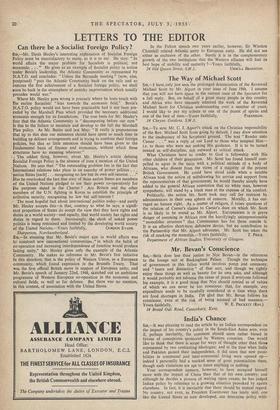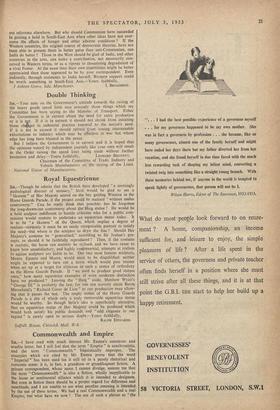India's Chance
SIR,—It was pleasing to read the article by an Indian correspondent on the impact of his country's policy in the South-East Asian area, even if, perhaps inevitably, the comment should seem rather biased in favour of conceptions sponsored by Western countries. One would like to think that there is scope for ways of thought other than those represented by two contrasting ideologies; and at the time when India and Pakistan gained their independence, it did seem that new possi- bilities in communal And inter-communal living were opened up— indeed I personally had a marked sense of great potentialities there, though such visitations are apt to mean anything or nothing.
Your correspondent appears, however, to have occupied himself more with the impact of China than that of his own country; and although he derides a process of waiting upon events, he has judged Indian policy by reference to a growing situation provoked by agents elsewhere. In fact, it is inevitable that there should be mutual regard. No country, not even, as President Eisenhower has lately said, one like the United States as now developed, can determine policy with- out reference elsewhere. But why should Communism have succeeded in gaining a hold in South-East Asia when other ideas have not over- come the effects of hunger and other adverse conditions ? If the Western countries, the original source of democratic theories, have not been able to present them in better guise than anti-Communism, can India do better ? Those in the West should be glad of India, and other countries in the area, can make a contribution, not necessarily con- ceived in Western terms, or as a riposte to threatening degradation of a rival Power. At the same time their own capabilities might be better appreciated than these appeared to be by your correspondent. Even indirectly, through assistance to India herself, Western support could be worth something in South-East Asia.—Yours faithfully,



























































 Previous page
Previous page